New fellowship program aims to elevate women in academic medicine
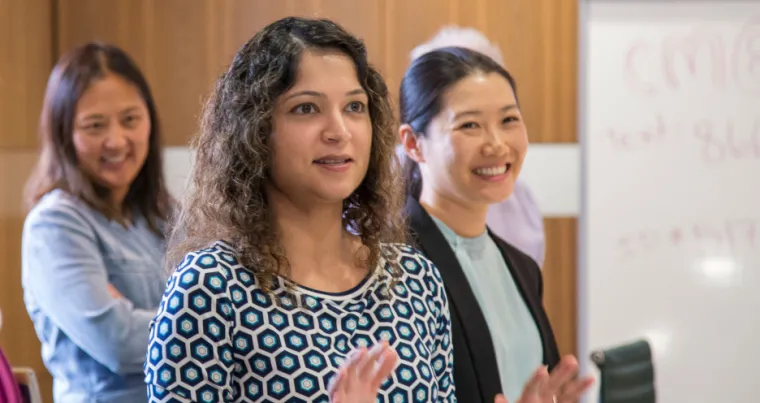
Salma Patel, MD, MPH (center), and Lora Wang, MD (right) are two members of the inaugural SSWIMS cohort.
Anna C. Christensen
More than two decades of changes — including a recent name change — have not altered the mission of Women in Medicine and Science (WIMS), a group committed to supporting women across the College of Medicine – Tucson community with networking and mentorship as they build leadership skills and camaraderie.
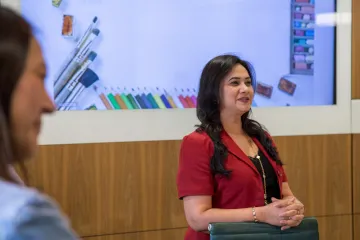
Hina Arif-Tiwari, MD
Anna C. Christensen
Founded in 1999 as Women in Academic Medicine (WAM), the group has earned a place at the college’s highest administrative level. Hina Arif-Tiwari, MD, vice chair of clinical affairs and chief of the Division of Abdominal Imaging, says the name change was a formality, coinciding with the group’s new place in the college’s executive structure and bringing it into alignment with similar groups at medical schools nationwide.
“The energy, vigor, soul, enthusiasm and passion that went into WAM continues in WIMS,” said Dr. Arif-Tiwari, who last fall was named the inaugural assistant dean of the college’s WIMS program. “The change comes with more focus on needs of women faculty. Now our program has an office in the Dean’s Suite. We have a title. We have a budget.”
Equipping leaders to grow
That enhanced support will expand the group’s offerings significantly. Dr. Arif-Tiwari is most excited about the yearlong Spurring Success for Women in Medicine and Science (SSWIMS) Fellowship, which will allow early- and mid-career faculty to develop their leadership skills. SSWIMS will provide role models, coaching, mentorship and networking opportunities that will accelerate participants’ journeys to academic leadership.
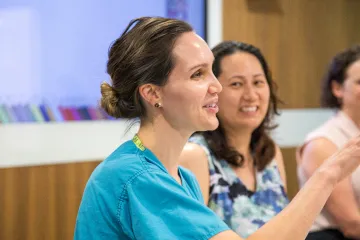
Anna C. Christensen
“It is a very comprehensive and thoughtful curriculum that will help them evolve as leaders at the end of the 12 months,” Dr. Arif-Tiwari said. “We want to create a cohort of future leaders. Our inaugural cohort is an excellent, very enthusiastic, and inspirational group of early-career leaders.”
Each month, half-day workshops will build participants’ skills in communication, conflict management, negotiations, inclusivity, work-life integration, and other essential skills for today’s leaders.
The fellowship will build upon already existing leadership talent — while simultaneously building confidence. Salma Patel, MD, MPH, assistant professor of medicine, associate program director and medical director, already juggles multiple leadership roles but still fights impostor syndrome.
“I felt as if I was at the bottom rung of the ladder for a long time — being a woman in a poor Indo-African family, vacuuming the hallways or cleaning my classmates’ toilets in college, and skipping medical school gatherings to go to work. These roles made me feel that I did not belong,” Dr. Patel said. “In hindsight, I belonged as much as anyone else, and these experiences make me feel strong as a leader today.”
Dr. Patel hopes to draw on these past experiences to create an environment where everyone feels a sense of belonging — which she believes is a facet of effective leadership that makes teams stronger.
“I ensure that all members of my team have a voice and feel empowered to use it. If people around me feel heard and supported, my leadership has more impact,” Dr. Patel said. “With a little more guidance and support through the SSWIMS fellowship, I hope to positively influence the dedication, morale and growth of those I lead.”
Sparking changes
Participants will also devote the year to a “Sparking Change” project, which will align with their professional goals while giving them hands-on experience honing their leadership skills in the workplace or community.
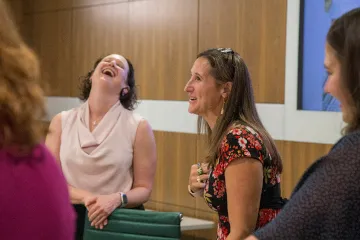
Helene Felman, MD (left), and Allison Huff, DHEd (right)
Anna C. Christensen
Many faculty members are already leading important projects and want to boost their skills to take them over the finish line. Holly Bullock, MD, MPH, associate professor and co-clerkship director of obstetrics and gynecology, spent three years spearheading a quality improvement project to increase options for miscarriage management, and she now wants to learn how to bring these changes to the Banner Health system.
“As we implement this regimen, I will be leaning into my SSWIMS leadership training to institute an assessment project. I hope to fashion a toolkit to facilitate adoption and implementation throughout the Banner system,” Dr. Bullock said. “I am excited by the prospect of early-career coaching and mentorship to further grow my leadership potential. I need new skills and connections to leverage across disciplines to create meaningful institutional change.”
Other fellows, such as Lora Wang, MD, associate professor of radiation oncology, want to take their leadership skills beyond the clinic and into the community, where they hope to help foster trust in science and academic medicine.
“My patients are inundated with horror stories and dire warnings from friends, family and even physicians of why they should not get the cancer treatment they need. Sometimes, those words of caution are what stop patients from receiving care,” Dr. Wang said. “There often is a disconnect between academic medicine and community outreach. My hope is that the fellowship can help me develop skills needed to become a leader in the community to help decrease the dissemination of baseless, inaccurate information.”
Building on a history of success
Founded in 1999 by Anne Wright, PhD, professor emeritus of pediatrics, and Kathryn Reed, MD, professor emeritus of obstetrics and gynecology, the group’s first big initiative was the GRACE Project (Generating Respect for All in a Climate of academic Excellence). They carefully analyzed data to push forward salary equity and leadership opportunities for female faculty, and by 2014, 25% of departments at the College of Medicine – Tucson were led by women, overseeing 45% of the college’s faculty and surpassing the national average for medical schools.
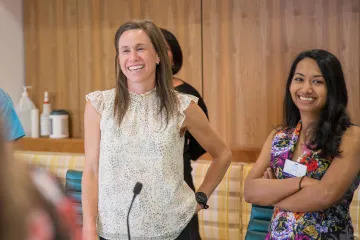
Anna C. Christensen
Dr. Arif-Tiwari, along with Mari Ricker, MD, professor of family and community medicine, took charge of the group’s steering committee in 2018. Since then, the group has been working hard to uphold its proud legacy, even expanding programming through the pandemic. Now that WIMS has been codified into the college’s infrastructure, Dr. Arif-Tiwari hopes their offerings won’t just help retain current faculty — they will also attract future faculty.
“The historic group that was founded in the ’90s focused on the needs of the faculty. That remains one of our highlights — career development, promotion, providing leadership training,” she said. “I also want this program to retain current trainees as future faculty, to inspire those in the pipeline to join us.”
These days, WIMS is excited to bring in more experts to lead workshops and share perspectives on panel discussions. Dr. Arif-Tiwari says these offerings are the “soul of the program.” Since being launched as an official program last fall, WIMS hosted several events with national speakers, including a panel discussion about gender bias in publication in authorship and a Research Day panel discussion about the impact and achievements of women in science.
At the end of the day, Dr. Arif-Tiwari hopes to build connections that will strengthen the college by bringing more women to the table.
“Our aspiration is to develop this cohort of women leaders who support each other. I found the group to be my anchor for difficult times, and I really value the relationships I have,” she said. “It’s good to know you’re surrounded by really strong women. It’s the fuel that keeps us going.”
The SSWIMS program planning committee consists of Allie Min, MD, associate dean of career development and professor of emergency medicine, Kathryn Glas, MD, MBA, chair of the Department of Anesthesiology, Mindy Fain, MD, professor of medicine and co-director of the Arizona Center on Aging, Bruce Coull, MD, vice dean of faculty affairs and professor of neurology, Celia Valenzuela, MD, vice dean of diversity, equity and inclusion, Mari Ricker, MD, professor of family and community medicine and director of the integrative medicine residency, and Salma Patel, MD, MPH, assistant professor of medicine.
The inaugural SSWIMS fellows are Anna Alkozei, PhD, clinical assistant professor of family and community medicine, Holly Bullock, MD, MPH, associate professor of obstetrics and gynecology, Helene Felman, MD, chief of the Division of General Pediatrics, Allison Huff, DHEd, assistant professor of family and community medicine, Olivia Hung, MD, PhD, clinical assistant professor of cardiology, Anna Landau, MD, MPH, DTM&H, clinical assistant professor of family and community medicine, Truc-Anh Nguyen, MD, clinical assistant professor of anesthesiology, Salma Patel, MD, MPH, assistant professor of medicine, Sujata Saha, MD, clinical assistant professor of surgical oncology, Stephanie Schock, MD, assistant professor of anesthesiology, Lora Wang, MD, associate professor of radiation oncology, and Stephanie Worrell, MD, FACS, clinical associate professor of surgery.
The WIMS book club, hosted by Indu Partha, MD, associate program director of the Internal Medicine Residency Program, will hold their inaugural meeting at 6 p.m. on July 27. They will discuss “The Beauty in Breaking” by Michele Harper. Sign up to attend the book club meeting.

